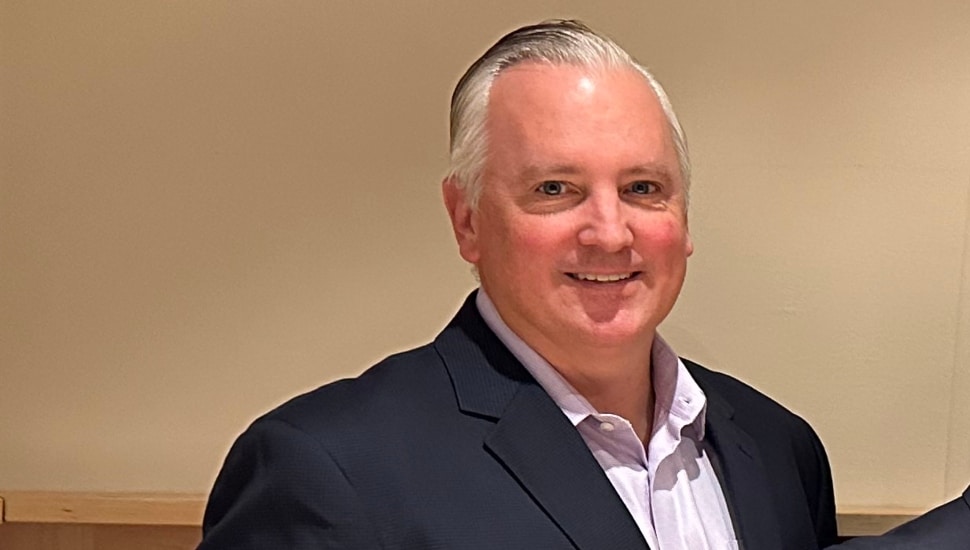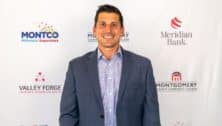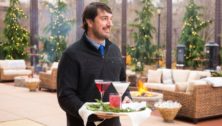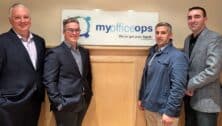Chester County Leadership: Steve Rickel, CEO, MyOfficeOps

Steve Rickel, CEO of MyOfficeOps, spoke to VISTA Today about growing up in a small farm town in Indiana. He was the only boy in his family, among three sisters and four female cousins. He recalled working part-time on his grandfather’s farm, where he learned repair skills he still uses today.
Rickel discussed the influential figures in his life who helped him choose and advance in a career in accounting, including a high school coach, a friend’s father, and his father-in-law. He also told how he created MyOfficeOps to outsource back office functions and why marketing is one of his top priorities for the year ahead.
Where were you born and where did you grow up, Steve?
I was born the third child of four and the only boy in a small town outside of Indianapolis, Indiana, called Fountaintown. Fountaintown is like the town from the movie Hoosiers — a small farm town.
So you were the only boy in the mix.
I am. It’s funny because my dad had a sister, and she and her husband had four children, who were all girls. We were close to them growing up, so there were eight of us, and I was the only boy.
What did your parents do?
My mother worked for Northwestern Mutual for 20 years. She was the secretary to the general agent until he retired. Then she went back to school for law, graduated with a 4.0, and became a legal secretary. She didn’t become a lawyer, but she would write briefs and legal arguments, and they always had very little changes.
My dad was a producer and director of the CBS affiliate in Indianapolis for 40 years.
What memories stay with you from growing up in Fountaintown?
We lived next door to my grandfather — my mom’s dad. My parents both worked, so I have a lot of good memories of spending time with him. He had a farm, and I spent a lot of time working for him and learning how to repair things.
And just the small town … everybody knows everybody. Your business is your own, but you can count on people. If you pick up the phone and you need something, three people will show up. I have good friendships that I’ve kept all these years.
My family was probably lower-middle class. We didn’t have a lot while I was growing up, so that’s made me more humble as I’ve gotten older and made me appreciate what they did for us.
Did you play any sports when you were young?
I attended a small high school, so the boys had to play every sport. I played the big ones: baseball, football, basketball. I was probably best at baseball. I pitched, I was a catcher, and I played third base.
When did you first realize you had leadership abilities and were in control of the game?
I think I learned that by experience — when you realize people are depending on you and that no one else is covering the bases. If you don’t know going in, you realize it very quickly.
There’s also a level of trust with your fielders to say, “I maybe can’t strike this guy out, but I need him to at least put it in play where I can trust our guys behind me.” That metaphor is the same in business.
What about jobs when you were growing up?
From elementary school through high school, I mostly worked for my grandfather on his farm. He liked to start around 9:00 in the morning and end around 3:00 PM. He was retired from Ford Motor Company, so this was just a side job for him.
Working for him didn’t pay well — he was my grandfather — so I would get up around 5:00 AM, ride my bike a mile down to another farmer, and work for him from about 5:30 to almost 9:00.
Later, in high school, on weekends, I would wash dishes at a local restaurant. I learned very quickly that if I wanted pocket money and if I wanted to do things, I had to generate that.
What kind of music were you listening to when you were young, Steve?
My mother had an incredible voice. She sang when she was in college at Indiana University. So, all the ‘50s music was big in our house. But I was a teenager, too, so the music my friends would listen to (I graduated from high school in 1987) was rock and roll, like Van Halen. I’d listen to country music, too. But I’ll listen to all kinds of music from R&B to Christian music to symphonies.
Where did you end up going to college?
I went to Butler University, which is in Indianapolis. I was also accepted by Michigan State, where my father went to school, and Indiana University, my mother’s school. My older sister Stephanie went to Butler, so I was familiar with it. It was small, at 5,000 students. While it was only 45 minutes from home, I think the first time I came home my first year was Thanksgiving, so I didn’t pop home often.
Was Butler a good choice for you, looking back?
At the end of the day, it was a great choice. I got a degree in accounting. They had a decent business school then, and now it’s a superb business school. I felt like I got a great education.
Why did you decide to pursue a career in accounting?
A couple of influential people played a part in my decision. In high school, I took an accounting class. The teacher for that class was also a coach of mine, and I was very interested in it. One of my friends’ dads was a CPA, and when we visited his office, I thought, “This is pretty cool.” Growing up with a lack of money, I was attracted to things that were about numbers and money, like banking and accounting.
I realized very quickly when I got into college and chose my major that accounting puts you into nearly every conversation in business. With our business now, our clients’, big or small, biggest questions are, “How much money do I have?” or “Who owes me money?” and “Who do I owe?”
After college, who saw promise in you and gave you opportunities that you may not have deserved at the time?
When I was in college, I did an internship at a company, and they ended up hiring me. My boss became a great friend, and I still see him when I return to Indiana. He was probably about seven or eight years older than me, so he was like a big brother. Sometimes I needed a kick in the backside, and he knew how to deliver that. I learned a lot about my profession, discipline, and hard work. And putting that hard work in has paid off. I worked for that boss for seven or eight years and then left when we moved out to West Chester, where I took my first CFO position.
Who else saw promise in you?
My father-in-law. He was an excellent businessman. He was one of those guys who would come into companies and turn them around. He’d stay two or three years at one company and then be on his way to the next one. He said to me, “You have to know when to stop being an accountant and start being a businessman. The accountant may tell you not to spend these dollars, but the businessperson will say, ‘Spending these dollars leads to this.'”
A lot of accountants are introverts. I’m not saying I’m a big extrovert, but I’m somewhere in between. I couldn’t have started this business without the experience and coaching I got from him.
When I was the CFO at a mortgage banking firm, around 2007 or 2008, I would get worried about the financial information. The bank’s CFO would say, “Sometimes the only thing you can do is advise them of the risk. The decision-making happens outside of you.”
That’s our job: to give them data. I can tell you what I’ve seen work and what I’ve seen not work.
What led you to start MyOfficeOps?
I was the CFO of several companies, and as CFO, I ended up running the whole back office. It starts with finance and accounting, but you quickly end up with HR and payroll reporting to you, then IT and the admins. They throw them at you because there’s nowhere else to put them.
It occurred to me that I could package that up because not every business can have a back office.
I thought I would stick to what I know, which is accounting, payroll, and financial information, and that would be the outsourced function. I observed that small businesses still, at times, need a CFO. They don’t need one full-time. They just need to be able to pick up the phone and have a conversation. Or they need someone to look at their information and get them some insights once a quarter or once a month. So, I developed this fractional back-office model.
I started MyOfficeOps when I was the CFO at a private equity firm. I had one foot in both places and realized that I wasn’t going to grow the business like that, so I completely stepped out of private equity. As soon as I did, MyOfficeOps went crazy. Revenue just skyrocketed.
When did you dedicate yourself to it full-time?
Jan. 1, 2016. I started my business in 2013, so I did a few years of both. It’s been great.
Here we are, heading into 2024. What are your priorities and what are you focused on?
In Q1 of 2023, I realized that growing the business and sales depended on me. I would do some sales and marketing, maybe get a client or two, and then have to come back to the business and work on fulfillment. I realized I needed a dedicated person to do sales and marketing.
We hired Mark Mehok in July of 2023, which was the right decision. I think I counted 12 new clients since July. Mark is a good friend, and he lives in my neighborhood, I’ve known him for 20-plus years. He had a very successful medical device distributorship. He and I would go for walks and discuss buying businesses and what we wanted to do. So, we are also interested in growth through acquiring certain operating companies if it’s a good fit as we continue to grow organically.
We have some ambitious goals. When Mark started, I said, “By the end of 2024, I want to have double the revenue we have now.” We’re just over a million in revenue, so we’re trying to get to $2 million. It was clear to me that we couldn’t get it the same way we got the first million. It has to be new thinking, new ways. I didn’t realize how important marketing was. You’re planting little seeds, and you never know which seed will grow fruit. For us at MyOfficeOps, it’s all about telling our story and our unique service offering because it resonates with many business owners.
What do you do in your free time?
I like to play golf when the weather is warm. I’m in a league with 16 guys, and we play once a month at different clubs around the area. I enjoy the scenery and the time with people; golf is often secondary. Unless I’m playing with my son — then we’re competitive. My son’s an incredible golfer.
Three final questions. What’s something big that you’ve changed your mind about over the last five or 10 years?
The environment is one. I always thought, “The Earth goes through its own changes. I don’t think we’re influencing it that much.” But my daughter and her thesis paper made me realize, “Wow, I only see what the media wants me to see.” There really are some things we’re doing that are harming Mother Earth.
Business-wise, there are two things: One is the notion I had that no one can do it better than I can. I would think, “Oh, I’ll just do it.” Now, I’m giving our staff flexibility and saying, “Here’s the outcome, and there are a hundred different ways to do it.” I wasn’t letting them grow professionally.
The second thing is the notion many older business owners have about millennials or younger people. Sometimes, they’re perceived as lazy or demanding. And yes, there are some like that, but what I misunderstood is that they don’t like wasting time. They want information right away and know how to get it. In the business environment, those who work for me say, “I have this app that can get the information so much quicker.”
It’s not that they’re lazy; they just don’t want to waste time.
It’s a crazy world with lots of chaos, Steve. How do you keep hopeful and optimistic?
You must seek out good stories as much as you hear about negative ones. I grew up in television, right? When you watch the news, it’s all about shock and awe. Even the one news program I watch now saves the last 60 seconds for the good stories. But you have to seek out and look for good, and that’s what makes me optimistic. I see those stories and think, “There is good in us.” It’s out there more than it’s not.
With politics being very polarized, we have news channels that are political. My dad tried to explain this before he passed away: There was a time when, if the anchor had some commentary, they had to flash “commentary” at the bottom. You had news, and you had commentary. Over the years, they got closer and closer together until they became one. Now, you can’t distinguish commentary from news.
The other thing I do to stay optimistic is to think of things I’m grateful for first thing in the morning. As I wake up and get out of bed, I thank the sunrise. I’m grateful for the air in my lungs. Then, I’m ready to get after it.
Finally, Steve, what’s the best advice you ever received?
There was a guy named Fran Cassidy who used to live across the street from me. His kids were nearly grown when mine were toddlers. He said, “Enjoy every age and have no regrets when it passes. Your kids will go through phases. You’ll get older, and you’ll change. But just enjoy every age.”
Some people say, “Oh, my kids are grown, I miss when they were toddlers.” I don’t miss when they were toddlers. I enjoyed every year, but I don’t miss them flopping on the floor and having a temper tantrum. I’m enjoying the now with my kids — going out, having some drinks, and having adult conversations.
Connect With Your Community
Subscribe to stay informed!
"*" indicates required fields







































![95000-1023_ACJ_BannerAd[1]](https://vista.today/wp-content/uploads/2023/03/95000-1023_ACJ_BannerAd1.jpg)










